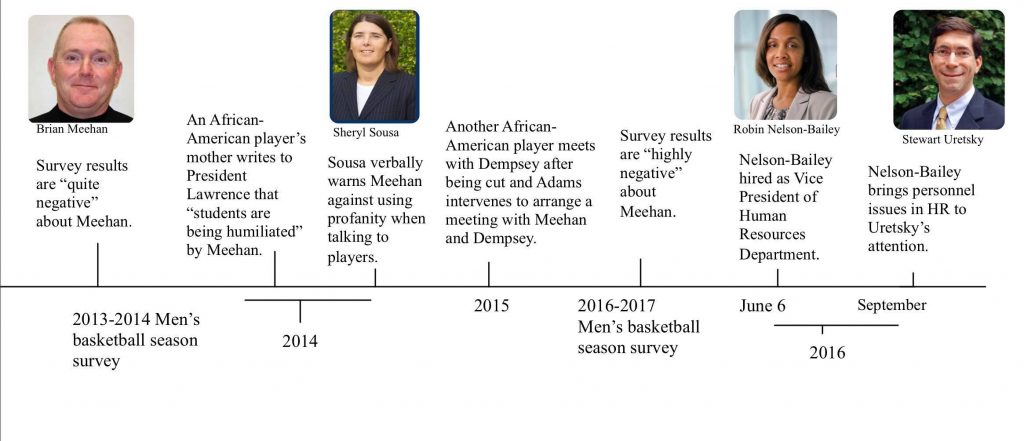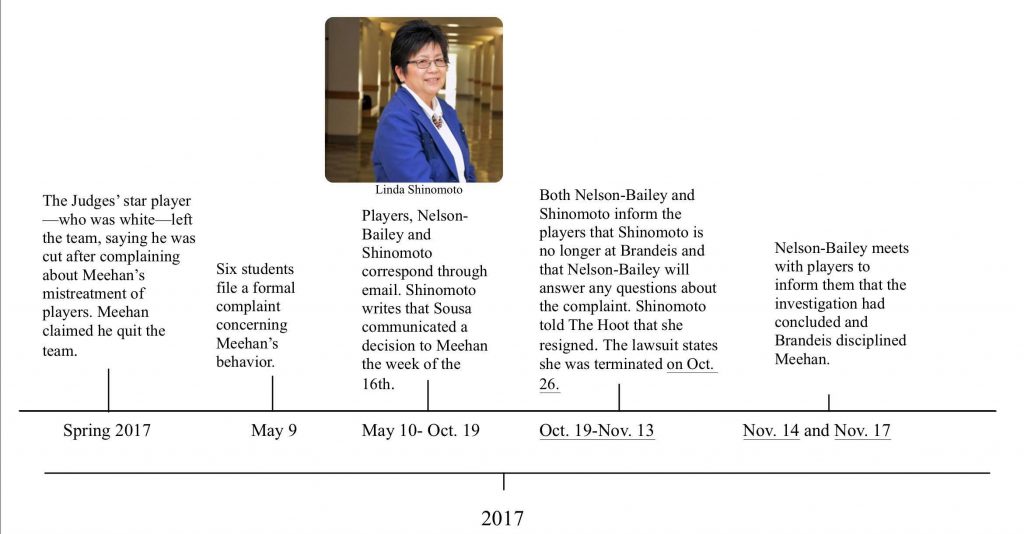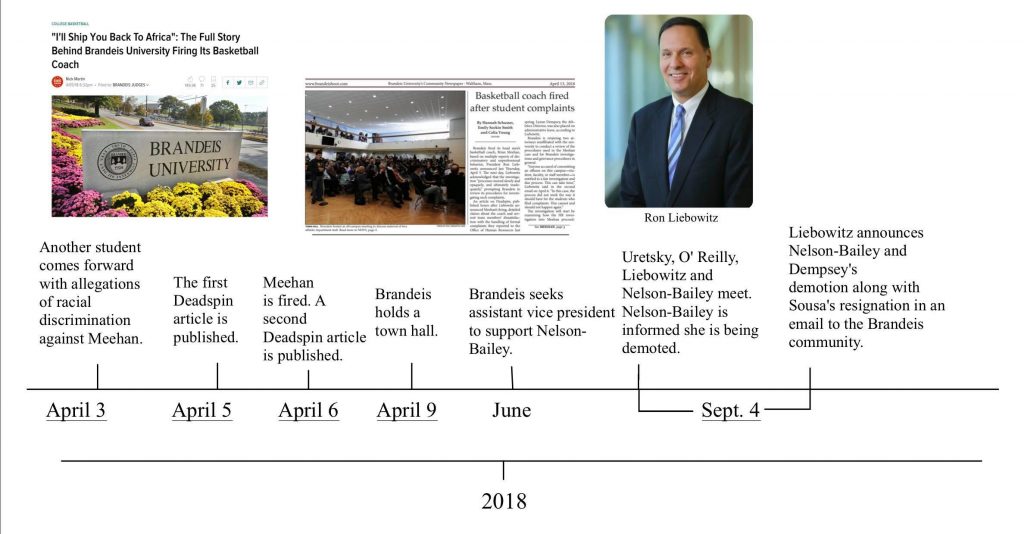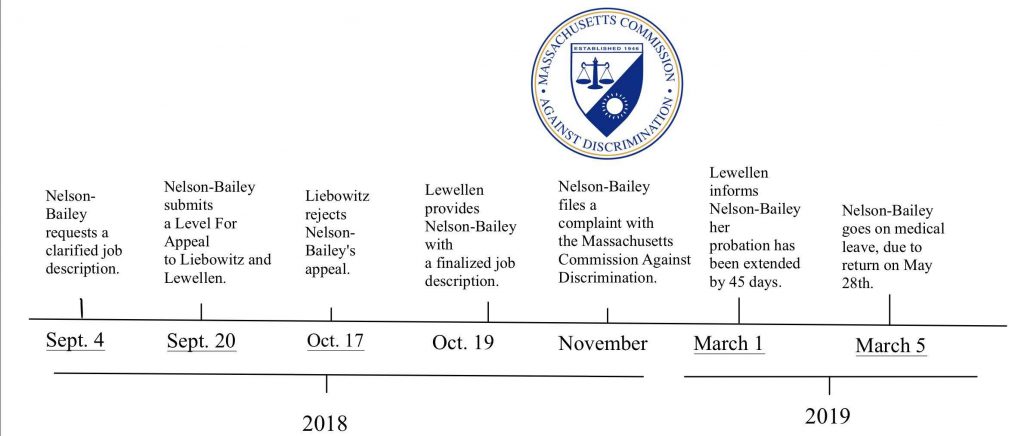A human resources employee is suing Brandeis for over $2 million on three claims of discrimination based on her race, color, age, sex and decision to retaliate against mistreatment.
The suit, filed by former Vice President of Human Resources Robin Nelson-Bailey after a shake up in the Brandeis Athletics department, names not only the university as a defendant, but also President Ronald Liebowitz, Executive Vice President for Finance and Administration Stewart Uretsky and Interim Vice President for Human Resources Larry Lewellen.
The suit claims that Nelson-Bailey, a 43-year-old African-American woman, complained of personal issues as early as her hiring in 2016 as Vice President of Human Resources and was constantly second-guessed while white, male employees were not. The suit alleges that following a Brandeis Athletics scandal, she was questioned, faced retaliatory conduct when she complained and was prevented from doing her job. To date, Nelson-Bailey is still employed at Brandeis as Assistant Vice President of Special Projects.
“I believe that Robin was treated illegally,” said Nelson-Bailey’s attorney, Matthew Fogelman of Fogelman & Fogelman LLC to The Brandeis Hoot. “It’s my job to advocate for a client, stand up for them, help them to have a voice and try to not only fight for their rights but really, in this situation, help to clear her name because her name has been tarnished.”
Examples of mistreatment alleged in the suit include interrupting Nelson-Bailey in meetings, constantly questioning her decisions, considering hiring a white subordinate to Nelson-Bailey who would be paid a higher salary, punishing Nelson-Bailey for failing to properly discipline an abusive basketball coach while male employees were not punished, refusing to clarify her job description and not providing her with the necessary resources to succeed.
The case was originally filed with the Massachusetts Commission Against Discrimination on November 19, 2018. On April 23, 2019, it was moved to Middlesex County Court. Fogelman spoke about the decision to move the case to the court system.
“This case is more appropriately litigated in court. We plan to have a trial in this case one day,” Fogelman said. “We want to try the case before a jury of Robin’s peers, and in the MCAD, you don’t get a jury trial, you just get a hearing by an MCAD officer, which for some cases, can be perfectly appropriate.”
The suit claims that Uretsky, Nelson-Bailey’s direct supervisor and a defendant named in the suit, treated her differently than other male staff members.
“Mr. Uretsky constantly second-guessed Ms. Nelson-Bailey’s decisions,” the suit reads. “This was not the case for white, male counterparts.”
The Hoot contacted Liebowitz, Uretsky and Lewellen for comment. Director of Media Relations Julie Jette responded that they could not comment on a pending lawsuit against the university. The three men are being represented by Greg Manousos of Morgan, Brown & Joy, LLP, according to Fogelman.
The suit focuses on Nelson-Bailey’s demotion after an independent investigation into the athletics department found her, in part, responsible for basketball coach Brian Meehan being allowed to continue to harass and abuse players.
It alleges that conduct of these three defendants resulted in Nelson-Bailey’s loss of wages and benefits, reputational harm, emotional stress, anxiety and depression, according to documents obtained from the Massachusetts Commission Against Discrimination and Middlesex County Court House.
Complaints Against the Coach: Nelson-Bailey’s involvement in the HR investigation into Meehan

When six students came forward with a formal complaint against basketball coach Brian Meehan alleging nepotism, racial discrimination and emotionally abusive conduct, Director of Employee and Employer Relations and Title IX Coordinator Linda Shinomoto was assigned the case.

While students had complained about Meehan since 2014, the investigation only began in May of 2017, according to a subsequent independent investigation into the athletics department. Shinomoto and Nelson-Bailey communicated with players in 2017, and Shinomoto compiled information about the coach, eventually providing their findings to Vice President for Student Affairs Sheryl Sousa.
The suit alleges that Shinomoto, Uretsky and General Counsel to the University Steven Locke questioned the need for a written report at the end of the investigation, and that in Nelson-Bailey’s meetings with Shinomoto, Shinomoto would ignore Nelson-Bailey and miss deadlines.
“Shinomoto would often be resistant to Ms. Nelson-Bailey’s guidance and blatantly ignored her feedback. Ms. Shinomoto missed deadlines, at times without communicating that she would not be able to meet them,” the suit reads.
But the independent investigation into athletics report claimed that Nelson-Bailey did not support Shinomoto.
“Nelson-Bailey had provided little if any support to her direct report, the HR investigator, in several key meetings. Nelson-Bailey also undercut the HR investigator’s findings with Sousa,” the report read.
Shinomoto disagreed on the suit’s characterization of her work when she spoke with The Hoot and said that she and Nelson-Bailey had a disagreement regarding the investigation but would not elaborate on what it was.
Sousa made the final decision to punish Meehan, giving him a final written warning. The suit alleges that Shinomoto did not recommend placing Meehan on leave or terminating his employment.
Shinomoto left Brandeis to take a position at Wentworth Institute of Technology as Vice President for Human Resources. Although Shinomoto claimed she resigned from Brandeis, the suit alleges that she was terminated on Oct. 26, 2017. Shinomoto would not comment if her resignation was linked to the HR investigation, but in a September 2018 interview, Liebowitz told The Hoot that her departure was not directly related to the investigation.

Nelson-Bailey informed the players that Meehan was disciplined, though she did not say what that punishment consisted of, according to the suit. After another player came forward with allegations of racial discrimination and the publication of an article about the coach from Deadspin.com, Liebowitz announced that Meehan was fired on April 6, 2018 in a community-wide email.
Brandeis hired two independent investigators to look into the handling of the HR investigation and held a campus-wide town hall, where students expressed their frustration, according to an earlier Hoot article.
That same year, the suit alleges that Uretsky suggested hiring a white female assistant vice president to Nelson-Bailey who would be paid a salary of $250,000, a salary higher than Nelson-Bailey’s.
After the outcome of the independent investigation, Liebowitz announced on Sept. 4 that Sousa had resigned and Athletic Director Lynn Dempsey had been placed on probation along with Nelson-Bailey.
According to the suit, before Liebowitz’s announcement, Uretsky, Nelson-Bailey and President Liebowitz’ chief of staff Bill O’Reilly met, and Uretsky told Nelson-Bailey she was being demoted and placed on two-week administrative leave but would not provide further details about the reason she was disciplined. The suit also states that only women were punished following the investigation and cites the lack of punishment of Uretsky, Locke, and Vice President for Student Affairs and Enrollment Andrew Flagel as evidence of discrimination.
The independent investigation found that Flagel tried to delay or change disclosure of Shinomoto’s finding of student discimination. In a September 2018 interview, The Hoot asked Liebowitz if Flagel’s departure was at all related to the independent investigation.
Liebowitz replied, “No, it wasn’t related directly to the investigation.” He said the same of Shinomoto’s departure.

After her demotion, the suit alleges discrimination continued.
The suit points to Nelson-Bailey’s replacement with a white male, Larry Lewellen, who allegedly received increased support and resources than she had in the same role.
The suit also alleges that Lewellen did not provide her with a new job description or professional development plan and prevented her from working on the Human Resources Department Affirmative Action Plan (AAP), through unnecessary delays and ineffective communication.
“When Ms. Nelson-Bailey reminded him about a finalized job description submitted through the Peoplesoft system as all Brandeis employees possess and is according to protocol, Mr. Lewellen said, ‘I do not necessarily follow the rules,’” read the suit.
When Nelson-Bailey appealed her demotion on Sept. 20, 2018, the suit alleges she faced retaliatory conduct by Lewellen in the form of increased supervision and control over her actions, questioning of her workload and need for support and lack of communication about office events and meetings.
Liebowitz rejected Nelson-Bailey’s appeal on October 17, 2018. The suit alleges that Nelson-Bailey inquired about the extent of her probation. Liebowitz informed her that he would be applying a policy meant for new university employees called the “Initial Review policy,” a procedure which Fogelmen called “misapplied.” In a September 2018 interview, a month before Liebowitz informed Nelson-Bailey of the policy, he told The Hoot about plans to apply it to both Nelson-Bailey and Dempsey.
In November of 2018, Nelson-Bailey filed a complaint with MCAD, and the suit alleges that following that complaint, Nelson-Bailey received less time with her supervisors and a 45-day extension to her six month probation.
The suit alleges that Lewellen accused Nelson-Bailey of not functioning effectively, collaboratively and cooperatively, and that he stated that her employment was contingent on her behavior to him.
On March 5, 2019, Nelson-Bailey went on medical leave with a return date of May 28 as a result, states the suit, of the defendant’s conduct.
Legal Issues to the suit
The lawsuit alleges that Nelson-Bailey was discriminated against by Brandeis University, violating Title VII; Massachussetts General Law 151B, which details “Unlawful Discrimination Because Of Race, Color, Religious Creed, National Orgin, Ancestry or Sex,” and the Age Discrimination in Employment Act of 1967 (ADEA), which “protects certain applicants and employees 40 years of age and older from discrimination on the basis of age in hiring, promotion, discharge, compensation, or terms, conditions or privileges of employment.”
The suit’s evidence of racial discrimination included that “Ms. Nelson-Bailey was the only black high-level employee during most of her employment.”
“Ms. Nelson-Bailey was also the only woman of color on the leadership team and was the sole Human Resources employee who was singled out and faced demotion after involvement in this investigation,” the MCAD complaint files said.
When asked about other evidence of Ms. Nelson-Bailey’s racial discrimination, Fogelman told The Hoot that it was a difficult question to answer.
“In [a case] involving race, gender, sexual orientation and so forth, it’s rare that you’re going to have a situation that’s blatant,” said Fogelman.
“Often times what you have in discrimination cases is what we call circumstancial evidence. If there aren’t other apparent reasons why someone is being treated a certain way, and they happen to fall into another race or gender or religion or what-have-you, in certain situations, and we believe that this is one of them, we do think that [that person was] treated differently because of those reasons,” he continued.
Nelson-Bailey’s counsel is currently awaiting a reply from the university and other defendants’ counsel.
The timeline is compiled from the MCAD report, lawsuit, an interview with Linda Shinomoto, interviews with President Ron Liebowitz and an interview with Nelson-Bailey’s attorney. Photos from brandeis.edu, wit.edu and the Brandeis Alumni Magazine.


